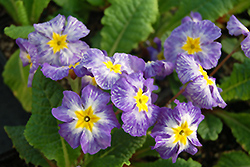Fri & Sat 8am - 8pm
Sun 8am - 7pm
Anytown, USA 12345
fax: 261.787.0463
e-mail: info@successgc.com


Plant Finder

Plant Height: 9 inches
Flower Height: 12 inches
Spacing: 10 inches
Sunlight:
![]()
![]()
Other Names: Cowslip, Polyanthus
Description:
This variety features eye catching clusters of royal blue blooms with yellow centers and white stripes, above darker green foliage for wonderful contrast; a colorful display in an indoor container or basket
Features & Attributes
Tie Dye Primrose features delicate clusters of royal blue star-shaped flowers with yellow eyes and white stripes at the ends of the stems from early to late spring. Its small serrated oval leaves remain green in color throughout the year.
This is an herbaceous evergreen houseplant with tall flower stalks held atop a low mound of foliage. Its extremely fine and delicate texture is quite ornamental and should be used to full effect. This plant may benefit from an occasional pruning to look its best.
Planting & Growing
When grown indoors, Tie Dye Primrose can be expected to grow to be about 9 inches tall at maturity extending to 12 inches tall with the flowers, with a spread of 12 inches. It grows at a fast rate, and under ideal conditions can be expected to live for approximately 5 years. This houseplant performs well in both bright or indirect sunlight and strong artificial light, and can therefore be situated in almost any well-lit room or location. It requires an evenly moist well-drained soil for optimal growth, but will suffer if left to grow in standing water. The surface of the soil shouldn't be allowed to dry out completely, and so you should expect to water this plant once and possibly even twice each week. Be aware that your particular watering schedule may vary depending on its location in the room, the pot size, plant size and other conditions; if in doubt, ask one of our experts in the store for advice. It is not particular as to soil type or pH; an average potting soil should work just fine.
There are many factors that will affect the ultimate height, spread and overall performance of a plant when grown indoors; among them, the size of the pot it's growing in, the amount of light it receives, watering frequency, the pruning regimen and repotting schedule. Use the information described here as a guideline only; individual performance can and will vary. Please contact the store to speak with one of our experts if you are interested in further details concerning recommendations on pot size, watering, pruning, repotting, etc.
-- THIS IS A HOUSEPLANT AND IS NOT MEANT TO SURVIVE THE WINTER OUTDOORS IN OUR CLIMATE --
